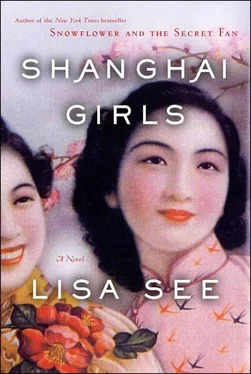From deep within the ship, cargo is brought up in big netted bundles and deposited on the pier. From there, most of the cargo goes straight on to the customshouse. Pretty soon, we see those same crates and boxes leave customs and get loaded onto trucks. Duties have been paid and the goods go on their way to new destinations, but we continue to wait in the rain.
Some crewmen hoist another gangplank-this one with no protection from the weather-onto the lower deck, where we are. A lo fan in a slicker bounds up the gangplank and climbs onto a crate. “Take everything you brought with you,” he shouts in English. “Anything you leave will be thrown away.”
People around us mumble, confused.
“What’s he saying?”
“Be quiet. I can’t hear.”
“Hurry up!” the man in the slicker demands. “Chop! Chop!”
“Do you understand him?” a soaked and shivering man next to me asks. “What does he want us to do?”
“Take your belongings and get off the boat.”
As we begin doing what we’re told, the man in the slicker puts his balled fists on his hips and yells, “And stay together!”
We disembark, with everyone pushing against one another as though it’s the most important thing in the world to be the first off the ship. When our feet touch ground, we’re marched not into the building to the right, where the other passengers went, but to the left, along the pier, and then across a tiny gangplank and onto a small boat-all without explanation. Once on board, I see that, although there are a few Caucasians and even a handful of Japanese, almost everyone here is Chinese.
The lines are let go, and we pull back into the bay.
“Where are we going now?” May asks.
How can May be so disconnected from what’s happening around us? Why can’t she pay attention? Why couldn’t she have read the coaching book? Why can’t she accept what’s become of us? That Princeton student, whatever his name is, understood her position perfectly, but May refuses to consider it.
“We’re going to the Angel Island Immigration Station,” I explain.
“Oh,” she says lightly. “All right.”
The rain gets heavier and the wind colder. The little boat bobs in the waves. People throw up. May hangs her head over the rail and gulps in wet air. We pass an island in the middle of the bay, and for a few minutes it looks like we’re going to chug back under the Golden Gate Bridge, out to sea, and return to China. May moans and tries to stay focused on the horizon. Then the boat veers to the right, curves around another island and into a small inlet, where it pulls up to a wharf at the end of a long dock. Low-slung white wooden buildings nestle on the hillside. Ahead, four stubby palm trees shiver in the wind and the wet flag of the United States slaps noisily against its pole. A large sign reads NO SMOKING. Again everyone pushes to be first off the boat.
“Whites without satisfactory paperwork first!” that same man in the slicker shouts, as though his higher decibels will somehow make the people who don’t understand English suddenly fluent, but of course most of the Chinese don’t know what he’s saying. The white passengers are pulled out of the line and brought forward, while a couple of squat and very solid guards push away the Chinese who’ve made the mistake of standing at the front of the line. But these lo fan don’t understand much of what the man in the slicker is saying either. They are, I realize, White Russians. They’re lower than the poorest Shanghainese, and yet they’re given special treatment! They’re led off the boat and escorted into the building. What happens next is even more shocking. The Japanese and Koreans are grouped together and politely led to a different door in the building. “We’re ready for you now,” the man in the slicker instructs. “When you get off the boat, line up in two lines. Men on the left. Women and children under twelve on the right.”
There’s a lot of confusion and a lot of manhandling by the guards, but once they line us up the way they want, we’re led in the driving rain along the dock to the Administration Building. When the men are sent through one door and the women and children through another-separating husbands from wives and fathers from families-cries of consternation, fright, and worry fill the air. None of the guards shows any sympathy. We are treated more poorly than the cargo that traveled with us.
The separation of Europeans (meaning all whites), Asiatics (meaning anyone from across the Pacific who isn’t Chinese), and Chinese continues as we’re marched up a steep hill to a medical facility in one of the wooden buildings. A white woman wearing a white uniform and a starched white cap folds her hands in front of her and begins speaking in English in that same loud voice that’s somehow supposed to make up for the fact that no one except May and I understands what she’s saying.
“Many of you are trying to enter our country with loathsome and dangerous parasitic diseases,” she says. “This is unacceptable. The doctors and I are going to check you for trachoma, hookworm, filariasis, and liver fluke.”
The women around us start to cry. They don’t know what this woman wants, but she’s wearing white-the color of death. A Chinese woman in a long white (again!) cheongsam is brought in to translate. I’ve been moderately calm up to now, but as I listen to what these people plan to do to us, I start to tremble. We’re to be picked over like rice being prepared for cooking. When we’re told to undress, murmurs of distress ripple through the room. Not so long ago I would have snickered with May about the other women’s prudishness, because we hadn’t been like most Chinese women. We’d been beautiful girls. Good or bad, we’d shown our bodies. But most Chinese women are very private, never exposing themselves publicly and rarely even in private before their husbands or even their daughters.
But whatever looseness I had in the past has disappeared for good. I can’t bear to be unclothed. I can’t stand to be touched. I cling to May, and she steadies me. Even when the nurse tries to separate us, May stays with me. I bite my lips to keep from screaming when the doctor approaches. I look over his shoulder and out the window. I’m afraid that if I close my eyes I’ll be back in that shack with those men, hearing Mama’s screams, feeling… I keep my eyes wide open. Everything’s white and clean… well, cleaner than my memories of the shack. I pretend I don’t feel the icy chill of the doctor’s instruments or the white softness of his hands on my flesh; I stare out across the bay. We face away from San Francisco now, and all I see is gray water disappearing into gray rain.
Land has to be out there, but I have no idea how far it is. Once he’s done with me, I allow myself to breathe again.
One by one, the doctor makes his examinations while we all wait-shivering from cold and fear-until everyone has given a stool sample. So far we’ve been separated from other races, then men separated from women, and now we women are separated yet again: one group to go to the dormitory, one to stay in the hospital for treatment for hookworm, which can be cured, and one for those with liver fluke, to be instantly and without appeal deported back to China. Now the tears really flow.
May and I are in the group that goes to the women’s dormitory on the second floor of the Administration Building. Once we’re inside, the door is locked behind us. Rows of bunks two across and three high are connected to one another by iron poles attached to the ceiling and floor. There are no “beds” to sleep on, just wire mesh. This means that the frames can be folded up to create more space in the room, but apparently no one wants to sit on the floor. The distance between bunks is barely eighteen inches. The vertical gaps between the bunks are so tight that at first glance I can see I won’t be able to extend my arm without hitting the one above. Only the top bunk has enough space to sit upright, but that area is cluttered with drying laundry of the women already here, which hangs on strings tied between the poles at the ends of the bunks. On the floor beneath each occupied tier of bunks are a few tin bowls and cups.
Читать дальше












